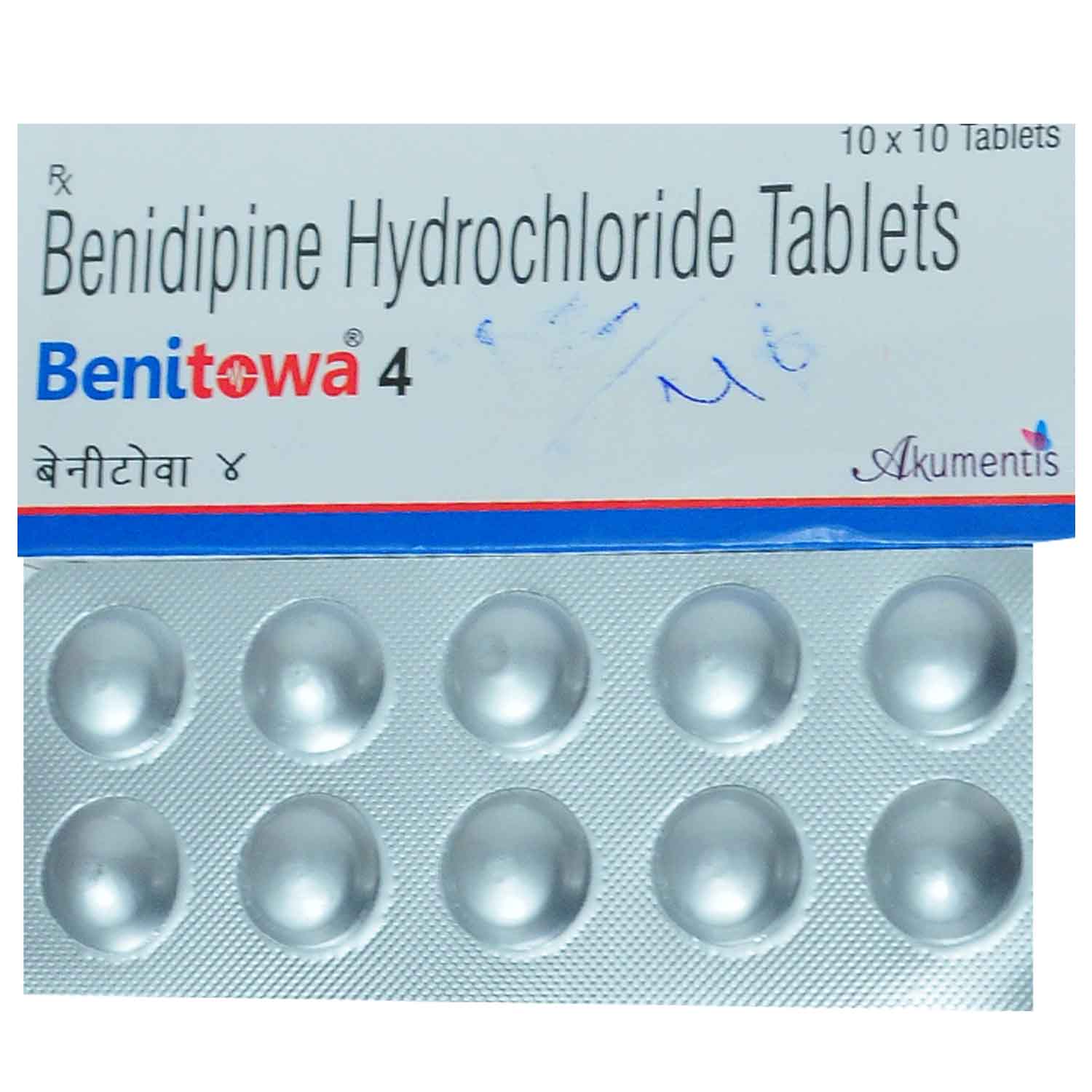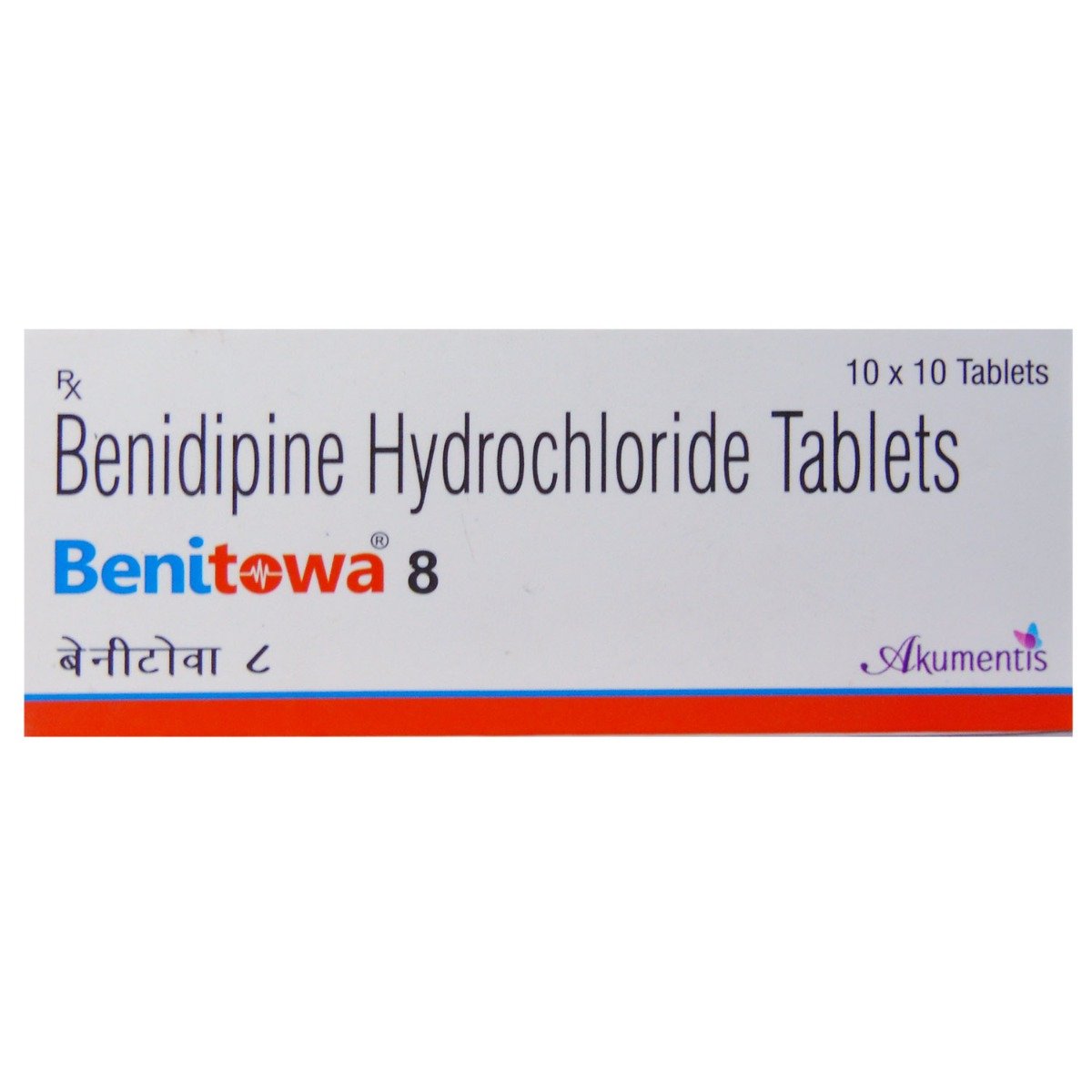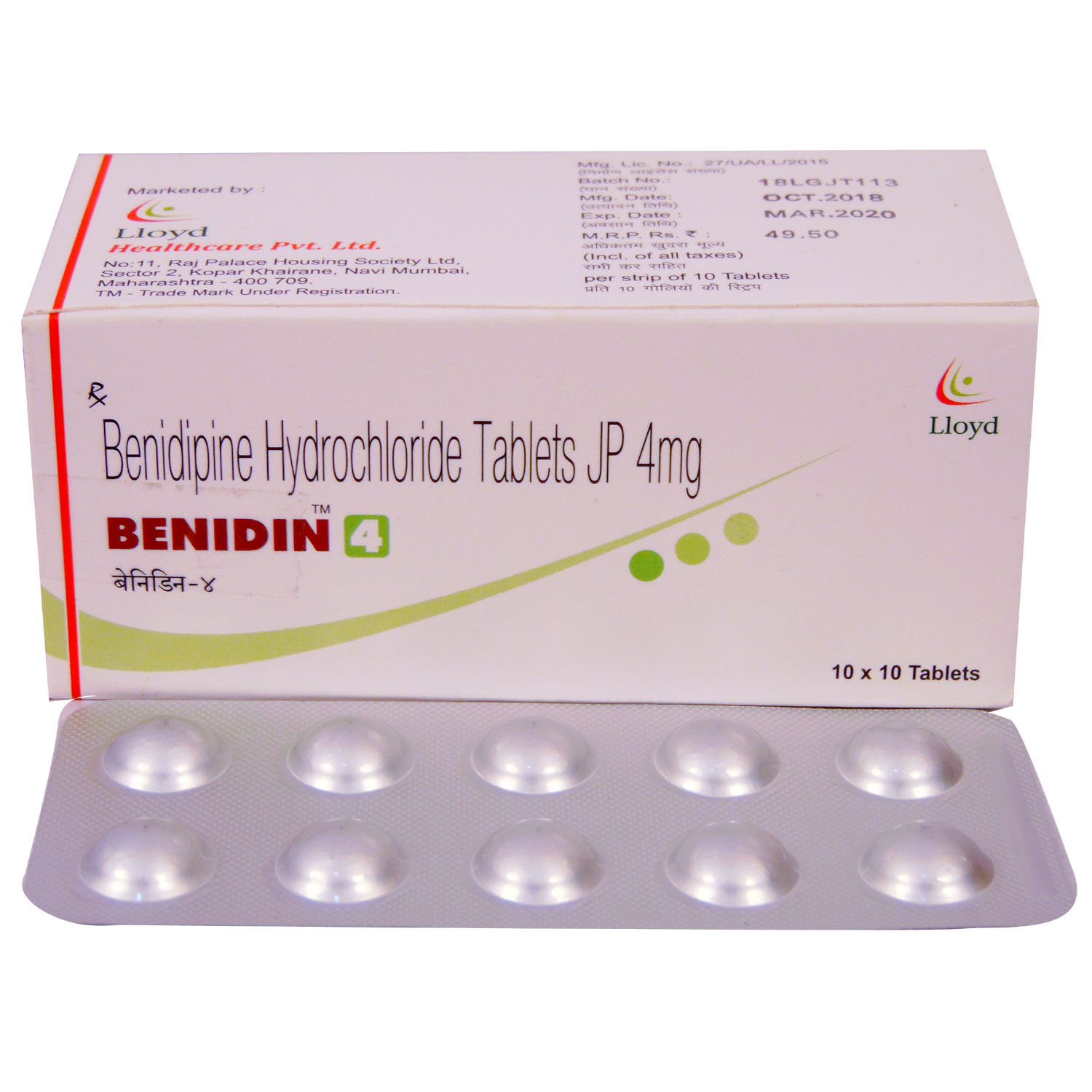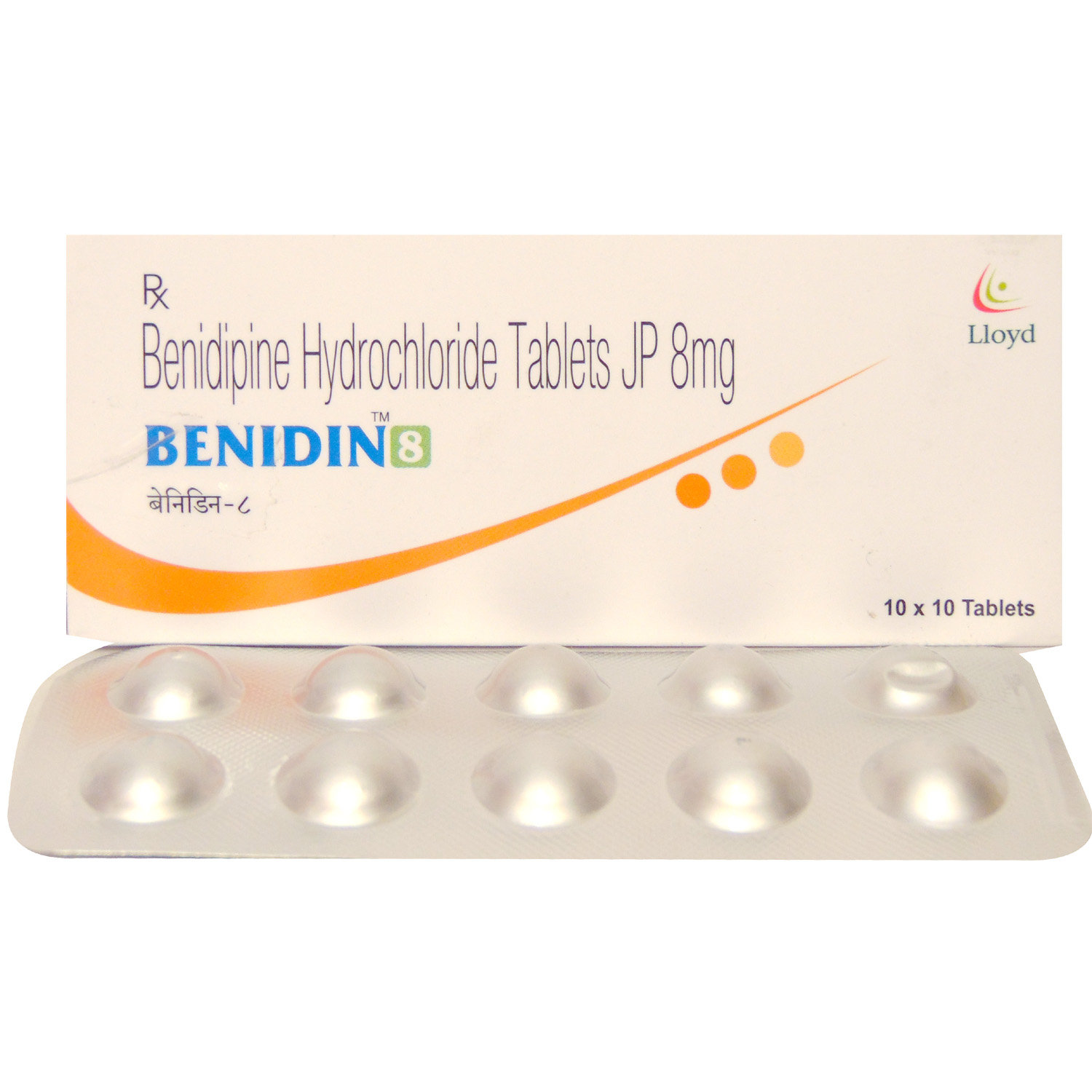Benidipine
About Benidipine
Benidipine belongs to the class of medicines called calcium channel blockers, used to treat hypertension (high blood pressure) and angina pectoris (chest pain).
Benidipine contains Benidipine, which works by relaxing the blood vessels, making it easier for the heart to pump blood throughout the body. This helps reduce blood pressure and treat chest pain.
Benidipine may cause side effects like fatigue, sleepiness, flushing, headache, dizziness, palpitations, nausea, oedema (swelling), and abdominal pain. If these side effects persist or worsen, consult your doctor.
Do not take Benidipine if you are allergic to any of its components. Consult your doctor if you are pregnant or breastfeeding. Keep your doctor informed about your health condition and medications to prevent any interactions.
Uses of Benidipine
Medicinal Benefits
- Benidipine contains Benidipine, a calcium channel blocker used to manage high blood pressure (hypertension) and chest pain (angina pectoris).
- It relaxes blood vessels, reducing blood pressure and making it easier for the heart to pump blood.
- Benidipine lowers blood pressure, helping prevent complications associated with hypertension.
- Benidipine also improves symptoms of angina, reducing chest pain and discomfort.
- It supports overall cardiovascular health by easing the workload on the heart.
Directions for Use
- Benidipine can be taken with or without food, as advised by your doctor.
- It is recommended to take Benidipine once daily or as advised by your doctor.
- Swallow Benidipine as a whole with a glass of water.
- Do not crush, break, or chew it.
Storage
Side Effects of Benidipine
- Fatigue
- Ankle swelling
- Sleepiness
- Flushing (sense of warmth in the face, ears, neck and trunk)
- Headache
- Dizziness
- Palpitations
- Nausea
- Oedema (swelling)
- Abdominal pain
Drug Warnings
- Do not take Benidipine if you are allergic to any of its components.
- Consult your doctor if you are pregnant, planning to become pregnant or breastfeeding.
- Inform your doctor if you have cardiogenic shock, low blood pressure, liver or kidney problems.
- Let your doctor know if you are using any other prescription or nonprescription (OTC) medicines.
Drug Interactions
Drug-Drug Interactions: Inform your doctor if you are taking blood pressure-lowering pills (benazepril, metoprolol, ramipril, hydrochlorothiazide), anti-TB (rifampin), antifungal (itraconazole), cardiac-glycoside (digoxin) or H2 blockers (cimetidine).
Drug-Food Interactions: Avoid consuming grapefruit and its juice during treatment with Benidipine, as it may lower blood pressure excessively.
Drug-Disease Interactions: Inform your doctor if you have low blood pressure (hypotension), liver disease, or kidney disease.
Drug-Drug Interactions Checker List:
Safety Advice

Alcohol
unsafeDo not consume alcohol while taking Benidipine to avoid unpleasant side effects like light-headedness, dizziness, and drowsiness.

Pregnancy
cautionIf you are pregnant, consult your doctor before taking this medicine. Your doctor may prescribe this medicine if the benefits outweigh the risks.

Breast Feeding
cautionBenidipine is not recommended for use in breastfeeding unless absolutely necessary. All the risks and benefits should be discussed with the doctor before taking this medicine.

Driving
cautionBenidipine may cause blurred vision, lightheadedness, and dizziness in some patients. Hence, do not perform any activities, such as driving a vehicle or operating machinery, if you experience these symptoms after taking this medicine.

Liver
cautionBenidipine to be taken with caution if you have had a history of liver disease. Your doctor may adjust the dose depending on your medical condition.

Kidney
safe if prescribedBenidipine is generally safe to be used in case of kidney diseases, and dose adjustment is generally not required. However, your doctor will decide the appropriate dosage depending on the severity of your condition.

Children
unsafeBenidipine is not recommended for use in children as the safety and efficacy data are not available.
Habit Forming
Diet & Lifestyle Advise
- Keep your weight under control with a BMI of 19.5-24.9.
- Do regular physical activity or exercise for at least 150 minutes per week, or about 30 minutes most days of the week. Doing this can help lower your raised blood pressure by about 5 mm Hg.
- Opt for a diet rich in whole grains, fruits, veggies and low-fat dairy products.
- Limit intake of sodium chloride (table salt) in your daily diet to 2300 mg per day or less than 1500 mg is ideal for most adults.
- If you are taking alcohol, only one serving for women and two servings for men is advisable.
- Quitting smoking is the best strategy to lower the risk of heart disease.
- Avoid chronic stress, as it can raise your blood pressure. Try to enjoy and spend time with your loved ones to cope with stress and practice mindfulness techniques.
- Monitor your blood pressure daily, and if there is too much fluctuation, immediately contact your doctor.
- Try to include heart-healthy omega-3 fatty acid-containing food drinks in your daily diet. You can also use low-fat cooking oil like olive oil, soybean oil, canola oil, and coconut oil can help lower your elevated blood pressure.
Special Advise
- Benidipine should be taken at the same time every day for its maximum effects to be seen and for increased compliance.
- A sudden drop in blood pressure may be seen while on this medication, which might lead to dizziness. Changing your posture at a slower rate might help counter this.
- Regular liver function tests are advised during treatment with Benidipine.
Patients Concern
Disease/Condition Glossary
Hypertension: Hypertension, also called high blood pressure, is a condition in which the force of the blood against the artery walls is too high. Symptoms include severe headaches, nosebleeds, fatigue or confusion, vision problems, chest pain, difficulty breathing, irregular heartbeat, and blood in the urine. Over time, if left untreated, it can cause health conditions such as heart disease and stroke.
Angina pectoris: Angina pectoris is a type of chest pain caused by reduced blood flow to the heart. Angina is a symptom of coronary artery disease. Angina is characterised by a sensation of squeezing, pressure, heaviness, tightness, or pain in the chest. It can be sudden or recur over time. Depending on the severity, it can be treated through lifestyle changes, medication, angioplasty (a procedure that restores blood flow through the artery), or surgery.
FAQs
Benidipine is used to treat hypertension (high blood pressure) and angina pectoris (chest pain).
Benidipine contains Benidipine, which works by relaxing the blood vessels, making it easier for the heart to pump more blood throughout the body. This ultimately reduces blood pressure and improves chest pain.
No, do not stop taking Benidipine even if your blood pressure is under control. Continue taking Benidipine for the duration advised by your doctor.
Benidipine contains Benidipine, a dihydropyridine calcium antagonist that may decrease body weight in some individuals. Although this is not necessary in all cases, if you experience any symptoms or drastic changes in your weight, consult your doctor and take appropriate treatment.
If you have a liver or a kidney disorder, inform your doctor. Your doctor will weigh the benefits over the risks.
Common side effects of Benidipine may include fatigue, ankle swelling, sleepiness, flushing (sense of warmth in the face, ears, neck and trunk), headache, dizziness, palpitations, nausea, oedema (swelling), and abdominal pain. If these side effects persist or worsen, consult your doctor.
You can take it at any time, but try to ensure it's around the same time every day. It is always best to follow the physician's instructions.
You should take Benidipine for as long as your doctor advises it. Do not stop it on your own or reduce your dose. Discontinuing Benidipine suddenly may increase your blood pressure or worsen angina.
Maintain a healthy diet and exercise regularly. Limit salt intake and avoid smoking & alcohol consumption. Manage stress by doing meditation or yoga.
Take the missed dose as soon as you remember, unless it's almost time for your next dose. In this case, skip the missed dose and take your next dose at the regular time. Never take a double dose to make up for a missed one.
Taking more than the recommended dosage does not provide additional relief and can increase the risk of adverse effects.
Avoid consuming alcohol along with Benidipine as it could lead to light-headedness, dizziness, and drowsiness.








